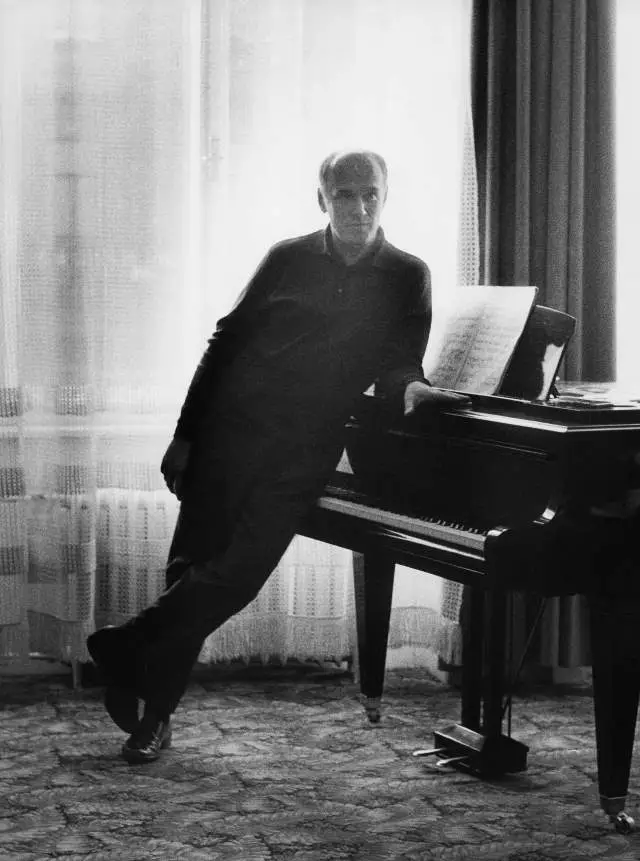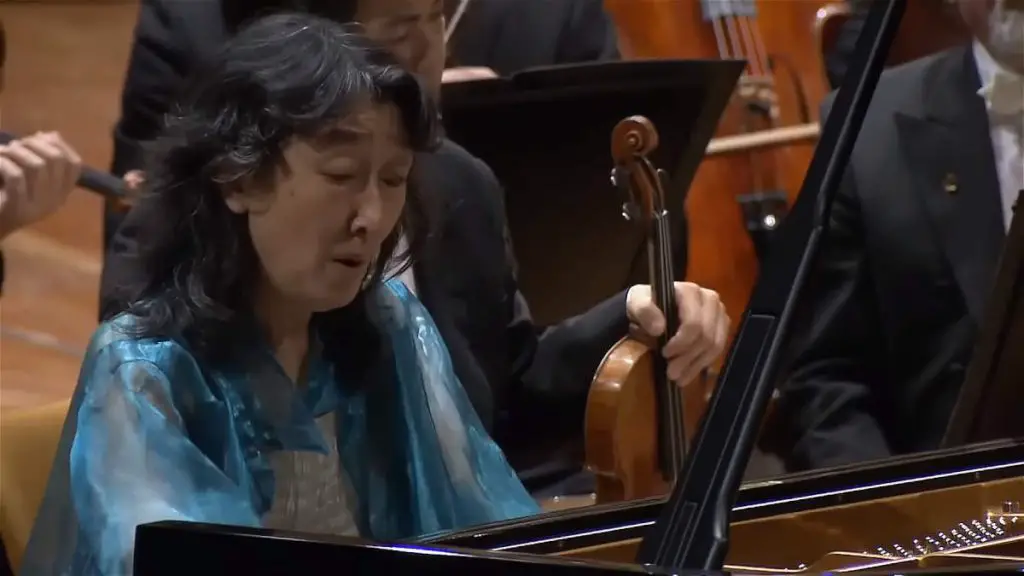Accompanied by the Japan Shinsei Symphony Orchestra, the legendary Ukrainian-born Soviet pianist Sviatoslav Richter performs Wolfgang Amadeus Mozart’s Piano Concerto No. 18 in B-flat major, KV. 456. Conductor: Rudolf Barshai (1924-2010), Soviet and Russian conductor and violist. Year of the recording: 1994.
Wolfgang Amadeus Mozart’s Piano Concerto No. 18
Wolfgang Amadeus Mozart’s Piano Concerto No. 18 in B-flat major, K. 456, is a work that exudes charm and sophistication, encapsulating the spirit of the classical era. Composed in 1784, during a period of remarkable creativity and productivity for Mozart, this concerto stands out for its melodic richness and intricate interplay between the solo piano and the orchestra. This was a time when Mozart was deeply immersed in the composition of piano concertos, resulting in works that were not only vehicles for his virtuosic talent as a pianist but also significant contributions to the concerto genre.
The concerto is often referred to by its nickname, “Paradis,” a moniker that has been mistakenly attributed over the years. The nickname was originally thought to be connected to Maria Theresia von Paradis, a blind pianist and contemporary of Mozart, but this connection has since been questioned by scholars. The mix-up in nicknames reflects the challenges of historical musicology and the occasional mysteries surrounding classical compositions.
Mozart’s approach to this concerto, like many of his compositions from this era, demonstrates his ability to blend innovation with the classical traditions of the time. He achieves a delicate balance between the soloist and the ensemble, allowing for moments of brilliance from the piano while ensuring that the orchestra plays a role that is both supportive and engaging. The orchestration is elegant, with Mozart utilizing the instruments to create textures that are both lush and transparent, allowing the piano’s lines to shine through.
The significance of Piano Concerto No. 18 goes beyond its immediate beauty and lies in its contribution to the development of the concerto form. Mozart was pioneering in his use of thematic development and the integration of the solo instrument with the orchestra, setting the stage for future generations of composers. This concerto, with its rich thematic material and innovative orchestration, exemplifies Mozart’s genius in manipulating musical form and expression.
The work is orchestrated for solo piano, flute, two oboes, two bassoons, two horns, and strings.
Movements
The concerto is in three movements, with the starting times in the video:
- 00:40 Allegro vivace
- 13:52 Andante in G minor
- 23:47 Allegro vivace
1. Allegro vivace
The first movement of Mozart’s Piano Concerto No. 18 in B-flat major, K. 456, is marked as Allegro vivace, setting the tone with its lively and spirited character. This opening movement is a brilliant showcase of Mozart’s compositional mastery, blending classical elegance with innovative musical ideas.
Structured in the traditional sonata-allegro form, the movement begins with the orchestra introducing the main thematic material. This orchestral exposition sets the stage for the piano’s grand entrance, where the solo instrument elaborates on the themes presented by the orchestra. Mozart crafts a dialogue between the piano and the ensemble, characterized by the exchange of musical ideas and a seamless interplay that highlights the concerto’s thematic unity.
One of the remarkable aspects of this movement is Mozart’s use of thematic development and variation. The themes are not merely presented and repeated; they are transformed and developed as the movement progresses. This is evident in the way Mozart manipulates the musical material, introducing variations in dynamics, rhythm, and harmony that add depth and complexity to the composition.
The piano’s role in this movement is both virtuosic and expressive. Mozart, a virtuoso pianist himself, wrote passages that showcase the instrument’s capabilities, from rapid scales and arpeggios to delicate, lyrical moments. The soloist navigates through these technical demands with grace and agility, all the while maintaining a sense of musicality and expression that is central to the concerto’s character.
The movement culminates in a cadenza, a section where the soloist performs alone, improvising or playing a written-out passage that elaborates on the movement’s themes. The cadenza serves as a moment of heightened expression, allowing the pianist to demonstrate technical skill and interpretive insight. Following the cadenza, the orchestra rejoins the soloist for a final statement of the themes, leading to a spirited and joyful conclusion.
2. Andante
The second movement of Mozart’s Piano Concerto No. 18 in B-flat major, K. 456, is an Andante un poco sostenuto, providing a stark contrast to the vivacious first movement. This movement is a serene and introspective passage that showcases Mozart’s skill in crafting deeply expressive music. Its slower tempo and lyrical qualities invite both the soloist and the listener into a contemplative space, characterized by its emotional depth and subtle nuances.
In this movement, Mozart employs a theme and variations form, a departure from the sonata-allegro structure of the first movement. The piano introduces a simple, yet profoundly expressive theme, which serves as the foundation for a series of variations. Each variation explores different aspects of the theme, altering its character through changes in texture, dynamics, and harmony. This approach allows Mozart to demonstrate the theme’s versatility and the emotional range of the piano as an instrument.
The orchestral accompaniment in the second movement is restrained and supportive, providing a delicate backdrop to the piano’s melodic line. The interplay between the soloist and the orchestra is more subdued than in the first movement, with the focus squarely on the lyrical and expressive qualities of the music. The orchestra complements the solo piano, adding color and depth to the variations without overshadowing the soloist’s performance.
Mozart’s use of harmony in this movement is particularly noteworthy. He employs unexpected harmonic shifts and modulations that add a layer of complexity and emotional nuance to the music. These harmonic choices contribute to the movement’s introspective character, inviting listeners to engage with the music on a deeply personal level.
The second movement culminates in a final variation that brings closure to the thematic exploration, returning to a sense of tranquility and peace. The movement ends quietly, leaving a lasting impression of introspection and emotional depth.
3. Allegro vivace
The third movement of Mozart’s Piano Concerto No. 18 in B-flat major, K. 456, is marked as Allegro vivace, returning to the spirited and lively atmosphere that opened the concerto. This final movement is a rondo, a form that Mozart frequently employed in his concerti, known for its recurring main theme that alternates with contrasting episodes. The rondo form provides a playful and dynamic conclusion to the concerto, showcasing Mozart’s inventiveness and his ability to engage both the soloist and the audience in a musical journey.
The movement begins with the orchestra introducing the main rondo theme, a cheerful and catchy melody that sets the tone for the rest of the movement. The piano soon takes over this theme, elaborating on it and adding virtuosic flourishes that demonstrate the soloist’s skill. The nature of the rondo form allows Mozart to explore a variety of musical ideas, as the recurring theme is interspersed with sections that contrast in mood, key, and texture.
One of the distinguishing features of this movement is the integration of playful interactions between the piano and the orchestra. Unlike the more introspective second movement, the third movement thrives on the lively exchange of musical ideas, with the solo piano often engaging in a call-and-response dialogue with various sections of the orchestra. This interaction contributes to the overall sense of joy and exuberance that pervades the movement.
Mozart’s treatment of the contrasting episodes is also noteworthy. These sections offer a departure from the main theme, introducing new material that provides contrast and keeps the listener engaged. Mozart demonstrates his mastery of orchestration and thematic development in these episodes, exploring different harmonic landscapes and showcasing the capabilities of the orchestra.
The movement’s culmination is marked by a virtuosic cadenza, where the soloist has the opportunity to display technical prowess and interpretative depth, before returning to the main rondo theme for a final statement. The concerto concludes with a spirited coda, bringing the movement and the entire concerto to a joyful and satisfying conclusion.
Sviatoslav Richter
Sviatoslav Teofilovich Richter (March 20 [O.S. March 7] 1915 – August 1, 1997) was a Ukraine-born Soviet pianist known for the depth of his interpretations, virtuoso technique, and vast repertoire. He is considered one of the greatest pianists of the 20th century.
Richter was born near Zhytomyr (Ukraine), in the Russian Empire. His father, Teofil Danilovich Richter (1872-1941), was a German expatriate pianist, organist, and composer who had studied in Vienna. His mother, Anna Pavlovna (née Moskaleva; 1893–1963), was from a landowning family, and at one point had been a pupil of her future husband.

On March 19, 1934, Richter gave his first recital, at the Engineers’ Club of Odessa; but he did not formally start studying piano until three years later, when he decided to seek out Heinrich Neuhaus, a famous pianist and piano teacher, at the Moscow Conservatory.
In 1949 Richter won the Stalin Prize, which led to extensive concert tours in Russia, Eastern Europe, and China. He gave his first concerts outside the Soviet Union in Czechoslovakia in 1950.
The West first became aware of Richter through recordings made in the 1950s. One of Richter’s first advocates in the West was Emil Gilels, who stated during his first tour of the United States that the critics (who were giving Gilels rave reviews) should “wait until you hear Richter.”
Richter’s first concerts in the West took place in May 1960, when he was allowed to play in Finland, and on October 15, 1960, in Chicago, where he played Brahms’s Second Piano Concerto accompanied by the Chicago Symphony Orchestra and Erich Leinsdorf, creating a sensation.
In 1961, Richter played for the first time in London. His first recital, pairing works of Haydn and Prokofiev, was received with hostility by British critics. Notably, Neville Cardus concluded that Richter’s playing was “provincial”, and wondered why Richter had been invited to play in London, given that London had plenty of “second class” pianists of its own. Following a July 18, 1961, concert, where Richter performed both of Liszt’s piano concertos, the critics reversed course.
In 1963, after searching in the Loire Valley, France, for a venue suitable for a music festival, Richter discovered La Grange de Meslay several kilometers north of Tours. The festival was established by Richter and became an annual event.
In 1970, Richter visited Japan for the first time, traveling across Siberia by railway and boat as he disliked flying. He played Beethoven, Schumann, Mussorgsky, Prokofiev, Bartók, and Rachmaninoff, as well as works by Mozart and Beethoven with Japanese orchestras. He visited Japan eight times.
Sources
- Piano Concerto No. 18 (Mozart) on Wikipedia
- Sviatoslav Richter on Wikipedia
- Piano Concerto No. 18 in B-flat major, K.456 (Mozart, Wolfgang Amadeus) on the International Music Score Library Project website
- Mozart’s Piano Concerto No. 18, K. 456, “Paradis” on the L.A. Phil website
